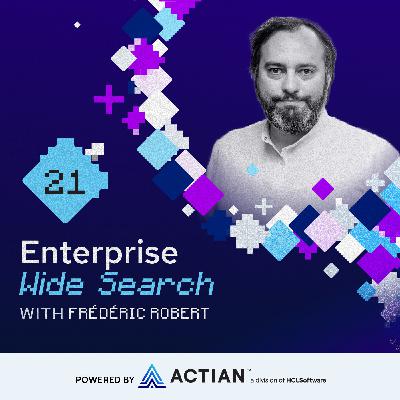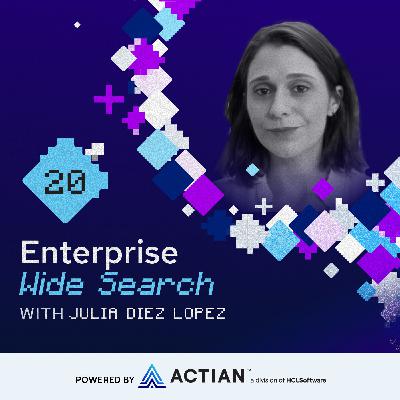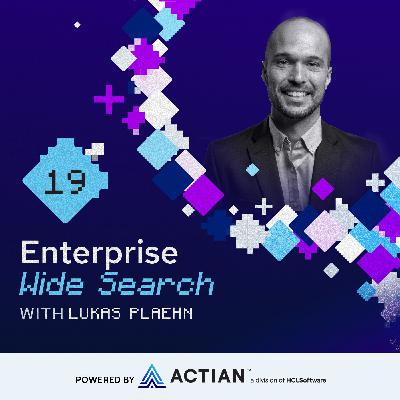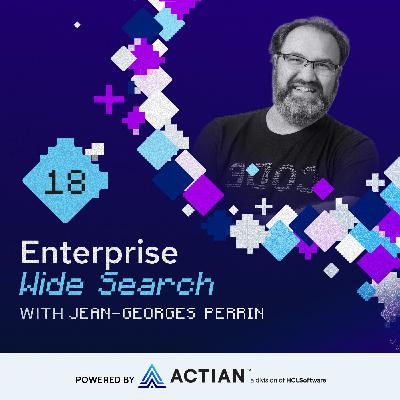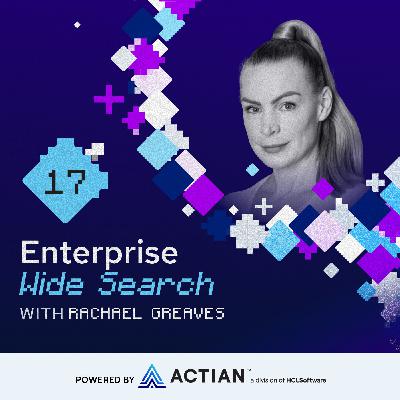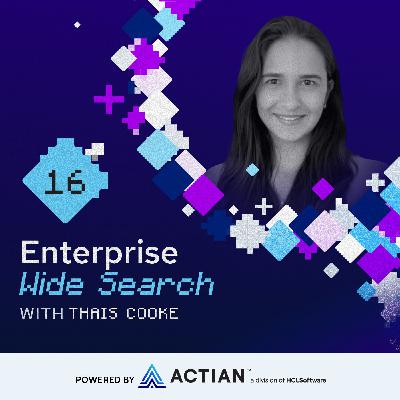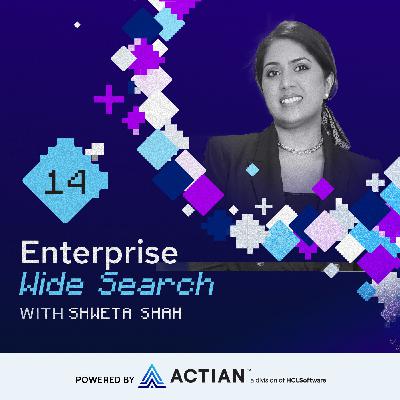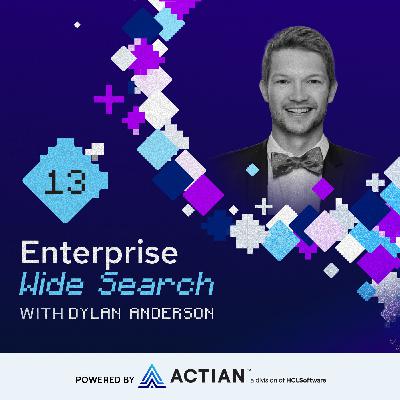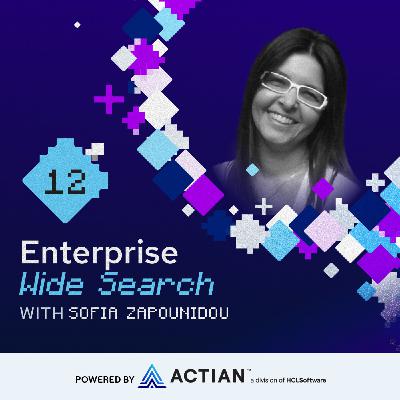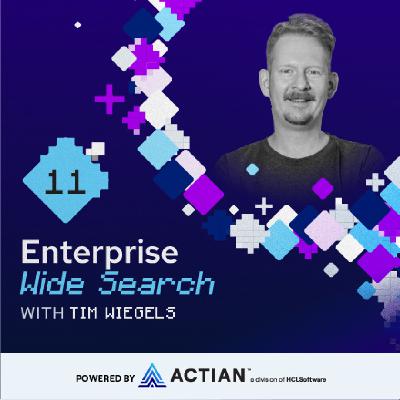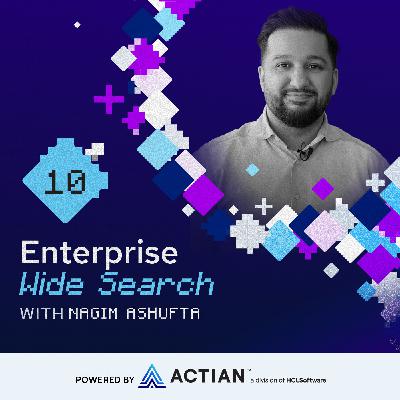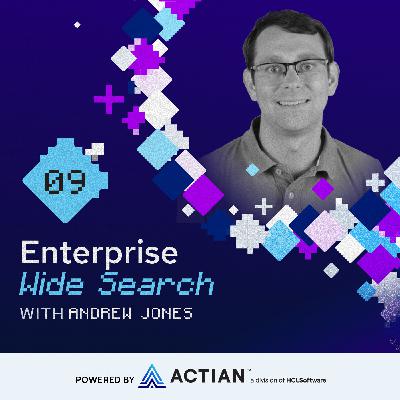Discover Enterprise Wide Search
Enterprise Wide Search

Enterprise Wide Search
Author: Actian
Subscribed: 2Played: 33Subscribe
Share
© Ole Olesen-Bagneux
Description
You’re listening to Enterprise Wide Search — powered by Actian.
Hosted by Ole Olesen-Bagneux, Chief Evangelist at Actian, and now joined by Emma McGrattan, Actian’s CTO and global data leader, this show explores the often-overlooked challenge at the heart of modern enterprises: finding and making sense of data.
Why is it still so hard to search across systems and uncover the data you need to do your job? Ole is obsessed with that question — and together with Emma, he speaks with authors, software inventors, data architects, industry leaders, and academics about the tools, processes, and ideas shaping the future of enterprise data search.
From metadata to data intelligence, governance to AI-powered discovery — Enterprise Wide Search is your guide to navigating enterprise data's wild, tangled world.
Hosted by Ausha. See ausha.co/privacy-policy for more information.
26 Episodes
Reverse
In this episode, co-hosts Emma McGrattan and Ole Olesen-Bagneux sit down with Frédéric Robert, Innovation and Data Advisory Director at Apgar, to unpack one of the most intriguing questions circulating in the data community: what happens to the data marketplace now that MCP (Model Context Protocol) is here?Drawing on nearly two decades across master data, governance, and AI programs, Frédéric shares a practitioner’s view on how organizations actually access, curate, and operationalize data — and why the rise of AI products is reshaping the entire value chain.Together, they explore:What a data marketplace really is (and why so many companies misunderstand it).Why AI and analytical products are becoming as important as data products.How MCP could automate large parts of data access, and where humans will still matter.Why metadata remains the foundation for any scalable AI initiative.The innovations he’s most excited about, from predictive data failure to new data‑driven business models.🎧 Tune in for a grounded conversation about the future of data access — beyond hype, fear, and the marketplace as we knew it.Hosted by Ausha. See ausha.co/privacy-policy for more information.
In this episode, co-hosts Emma McGrattan and Ole Olesen-Bagneux sit down with Julia Diez, Localization Software Engineer at McAfee and the author behind one of the most quietly brilliant Substacks in tech today.Trained as a linguist and now working at the intersection of metadata, multilingual ontologies, and LLMs, Julia brings a rare perspective to the world of data and AI—one shaped by bookstores, translation memories, and a deep appreciation for cultural nuance.Together, they explore:Why translating “Welcome, User” might not be as simple as it sounds.The hidden complexity of plurals, pronouns, and color in globalized software.How language, etymology, and pragmatics shape our technologies (and sometimes break them).What it means to build a multilingual knowledge graph, and why it matters in the age of AI.Why localization isn’t just post-processing, but a design principle for global systems.🎧 Tune in for a conversation that moves from Copenhagen to Cork, metadata to meaning—reminding us that culture, language, and context are just as foundational as code.Hosted by Ausha. See ausha.co/privacy-policy for more information.
In this episode, co-hosts Emma McGrattan and Ole Olesen-Bagneux sit down with Lukas Plaehn, Head of Data Office at Bank of Valletta, to explore what makes data so hard to manage in financial institutions—and why that challenge goes deeper than technology.From Malta’s sun-soaked shores to the global stage of regulatory compliance, Lukas brings a thoughtful voice to some of the industry's most complex issues.Together, they explore:Why trust—not technology—is the core tension in financial data management.The layered legacy of banks, and how smart people can slow transformation.What systemic banks are, and why regulators are making data quality the law.How ontologies, data contracts, and shared models are reshaping the industry.Why BI is blurring with operational tech, and how this could finally close the loop from reporting to prediction.🎧 Tune in for an insightful look into what it takes to modernize data in one of the world’s most risk-averse industries.Hosted by Ausha. See ausha.co/privacy-policy for more information.
In this episode, co-hosts Emma McGrattan and Ole Olesen-Bagneux sit down with Jean-Georges Perrin—better known as JGP—to discuss the future of data products, the limitations of BI, and the importance of federated thinking in an era of real-time everything.From his early days self-publishing a 300-page C++ guide with a classmate (armed with nothing but Word and a photocopier) to writing Implementing Data Mesh with O’Reilly, JGP reflects on why storytelling, open standards, and metadata will shape the next era of enterprise data.Together, they explore:Why dashboards aren’t data products—and what that reveals about the lifecycle of data.The origin story of Bitol and its zero-code approach to defining open standards.What’s next for Data Mesh after the GenAI hype wave.Why BI might die (and why that’s not a bad thing).How federated governance beats both centralized and decentralized extremes.🎧 Tune in for an honest, funny conversation about the future of data platforms—and why sometimes, it’s more helpful to say what something isn’t.Hosted by Ausha. See ausha.co/privacy-policy for more information.
In this episode, co-hosts Emma McGrattan and Ole Olesen-Bagneux sit down with Rachael Greaves, CEO of Castlepoint Systems and pioneer of regulation-as-code AI, to unpack why records and information management are more relevant—and more technical—than ever.Together, they explore:The sometimes overlooked discipline of records management and why it matters in the age of AI.Why data lifecycle decisions are so hard, and why deletion is sometimes the safest option.What ethical AI actually means and how to make it explainable and contestable by design.How Castlepoint uses rules-as-code to govern massive, messy, enterprise-scale datasets.Rachael’s advice to anyone (especially women) entering regtech, cyber, or data governance.🎧 Tune in for a conversation that connects the dots between compliance, security, metadata, and meaning—and why AI won't fix your governance mess if your rules aren’t clear.Hosted by Ausha. See ausha.co/privacy-policy for more information.
In this episode, co-hosts Emma McGrattan and Ole Olesen-Bagneux sit down with Thais Cooke, Senior Healthcare Data Analyst and LinkedIn Learning instructor, to discuss what happens when curiosity meets chaos—and how a career shift from frontline healthcare to data analytics has unlocked new ways of thinking about impact, problem-solving, and AI.Together, they explore:Thais’ transition from burned-out dental professional to SQL-obsessed analyst.How learning to “follow the pain” helped her solve real-world problems with data.Her approach to using AI without outsourcing critical thinking.Why domain expertise is often the missing piece in data analysis and governance.How she created two LinkedIn Learning courses tailored to healthcare professionals.🎧 Tune in for an inspiring take on learning, career change, and making AI part of your workflow, without losing your voice along the way.Hosted by Ausha. See ausha.co/privacy-policy for more information.
In this episode, co-hosts Emma McGrattan and Ole Olesen-Bagneux sit down with Jérémy Ravenel, researcher, advisor, and founder of the open-source NaasAI platform. Known for bridging the gap between theory and execution, Jérémy shares his journey from Excel-heavy finance roles to leading cutting-edge research in AI interoperability and enterprise knowledge graphs.Together, they explore:Why so many GenAI initiatives fail without semantic structure and context.What it means to “clean your room” before deploying AI agents.How ontologies can evolve from niche academic tools to practical building blocks of enterprise-scale AI.The tension between perfection and pragmatism in data work.🎧 Tune in for a conversation on the hidden structures behind meaningful AI, and why the future might depend on how well we model what we already know.Hosted by Ausha. See ausha.co/privacy-policy for more information.
In this episode, co-hosts Emma McGrattan and Ole Olesen-Bagneux sit down with Dr. Shweta Shah, a seasoned data and AI architect with a fresh perspective on how we think about quality in the age of unstructured data and GenAI. Shweta introduces “Content Quality Management” (CQM), a new framework designed to help organizations prepare unstructured content for trustworthy, auditable, AI-powered outcomes.Together, they explore:Why traditional data quality frameworks fall short in GenAI systems.The seven dimensions of content quality.Why unstructured data needs more than structure to be AI-ready.The role of team diversity and ethical design in building AI that works for everyone.How CQM could evolve into a new standard—or even a product—for enterprise AI readiness.🎧 Tune in for a timely conversation that reframes unstructured data not as a challenge, but as an opportunity to rethink what “quality” really means in modern data work.Hosted by Ausha. See ausha.co/privacy-policy for more information.
In this episode, co-hosts Emma McGrattan and Ole Olesen-Bagneux sit down with Dylan Anderson, Head of Data Strategy at Profusion and author of The Data Ecosystem newsletter. Dylan brings a pragmatic, field-tested perspective on how to bridge the gap between strategy and implementation—and why many organizations still struggle to align data with business value.Together, they explore:Dylan’s work helping companies turn vague goals into actionable data strategies.The real reasons enterprise-wide search still falls short, and how AI can help fix it.Why data catalogs disappointed, and what it takes to build real access and insight.The toughest part of connecting data and business strategy.🎧 Tune in for a conversation about the messy reality of data transformation—and why the best strategies are the ones that actually get used.Hosted by Ausha. See ausha.co/privacy-policy for more information.
In this episode, co-hosts Emma McGrattan and Ole Olesen-Bagneux welcome Sofia Zapounidou, Team Lead at the Publications Office of the European Commission and a lifelong champion of metadata, identifiers, and meaning in a machine-readable world. Drawing on her background in library and information science, Sofia offers a unique perspective on the evolution of data work—from card catalogs to linked open data—and what today’s AI and data communities can learn from the past.Together, they explore:Sofia’s work leading a linked data transformation at the European Commission.What librarians have always known—and technologists often forget—about user context and information architecture..Why data migration is an opportunity to improve data quality, not just preserve it.How FRBR (and now LRM) reshaped library metadata as a graph-based model.Why data needs continuous curation, and how to build a culture that supports it.🎧 Tune in for a conversation that bridges the gap between tradition and innovation, reminding us that behind every intelligent machine is a century of human effort to describe the world clearly.Hosted by Ausha. See ausha.co/privacy-policy for more information.
In this episode, co-hosts Emma McGrattan and Ole Olesen-Bagneux sit down with Tim Wiegels, Executive Data Advisor and former VP of Data at FreeNow. Known for his brutally honest and refreshingly pragmatic take on building data teams, stacks, and cultures, Tim shares lessons from a career spanning gaming, mobility, and high-growth tech.Together, they explore:Tim’s journey from bioinformatics PhD to startup veteran and strategic advisor.Why he believes your first hire shouldn’t be a data scientist—or even a data engineer.The rise of the analytics engineer and why Excel skills still matter more than most admit.The myth of the all-knowing centralized data team—and how to rethink service, ownership, and collaboration in real-world enterprises.🎧 Tune in for an unfiltered, field-tested look at what it really takes to move organizations from spreadsheet chaos to data-driven confidence.Hosted by Ausha. See ausha.co/privacy-policy for more information.
In this episode, co-hosts Ole Olesen-Bagneux and Emma McGrattan sit down with Nagim Ashufta, founder of DRIVA and one of the most philosophical voices in the data world today. Known for weaving together history, human nature, and the hard realities of data work, Nagim brings a rare and much-needed perspective to the conversation around data, governance, and transformation.Together, they explore:Nagim’s global journey—from Kabul to Hamburg—and how it shaped his unique worldview on data and systems.Why his work focuses on enablement over abstraction, and how data teams can act as support systems rather than consultants.What a mulberry leaf, silk, and solitude can teach us about the slow, deliberate nature of data work—and why rushing outcomes often misses the point.Why terms like data product and data catalog may need to evolve to reflect more human-centered, collaborative paradigms.The hidden dynamics of power in federated data strategies—and why acknowledging them is key to sustainable governance.🎧 Tune in for a reflective conversation that challenges the way we think about data, control, and collaboration—and why the next big leap in data might just begin with people.Hosted by Ausha. See ausha.co/privacy-policy for more information.
In this episode, co-hosts Ole Olesen-Bagneux and Emma McGrattan sit down with Andrew Jones, Principal Engineer and author of Driving Data Quality with Data Contracts (Packt Publishing). Widely credited with coining the term “data contract,” Andrew walks us through how a deceptively simple idea evolved into one of the most impactful trends in modern data architecture.Together, they explore:Andrew’s journey from software engineering to data leadership.How unreliable data led him to pioneer the concept of data contracts.The surprising connections—and distinctions—between data contracts and data mesh.Why data contracts are gaining momentum as the practical backbone of the “shift-left” movement.Real-world lessons from organizations implementing contracts to improve data quality, governance, and developer experience.🎧 Tune in to understand why data contracts aren’t just a trend—they’re becoming the foundation for reliable, federated data management.Hosted by Ausha. See ausha.co/privacy-policy for more information.
In this special episode, Ole Olesen-Bagneux welcomes Emma McGrattan, Actian’s CTO, as the new co-host of Enterprise Wide Search. Emma shares her journey from coding her first game at age 12 to leading global data innovation at Actian for over three decades.Together, they explore:Emma’s early experiences with technology and her path into data engineering.The pervasive role of Actian’s technology in everyday life, from morning routines to global transportation systems.The evolution of data management: from conserving storage space to enabling AI-driven decision-making.Emma’s favorite cities and the cultural insights she’s gained through her travels.🎧 Join us as we delve into Emma's experiences and perspectives on the podcast, setting the stage for future explorations of enterprise data.Hosted by Ausha. See ausha.co/privacy-policy for more information.
I talked to Chief Data Architect, dr. Anna Ibrahim on Episode 07 - and this conversation marks a new direction for my podcast, as I will talk more concretely about the Meta Grid in the episodes going forward.As you will hear, Anna has deep technical understanding and - just as important - organizational experience to testify that the Meta Grid is already out there. In this conversation, we discuss the wealth of metadata repositories, that each at least in principle leverage different, distinct capabilities - albeit they contain the same metadata.However, Anna precisely addresses that this is not always the case, that there is an overlap of capabilities delivered by metadata repositories, and points to the paradox that vendors try to position themselves as unique, although they actually deliver redundant capabilities.Nevertheless, we expand the topic to include not only vendors, but also consultancies and internal employees - this reality that I call the Good, the Bad, and the Ugly (all three parties can play all three roles).Also, at least for the next couple of months, I have decided to publish episodes on my podcast a little less frequently, but deeper and slightly longer conversations. I simply have to finalize my book, Fundamentals of Metadata Management (O'Reilly, 2025).In conclusion, I am very happy I got to have this conversation. I think that tech- and consultancy companies should listen to this episode. For each industrial company I sare to claim: The Meta Grid is already there.Hosted by Ausha. See ausha.co/privacy-policy for more information.
Episode 06 is out! I spoke to Solomon Kahn that is the CEO of Delivery Layer and co-founder of Top Data People. We spoke about both companies, however my key interest in reaching out to Solomon is Delivery Layer. It's sort of a reverse Customer Data Platform (CDP) and I think that's surprising, but relevant, way to be searching data.I also spoke about data influencing with Solomon. I really don't like being called a data influencer, but Solomon totally embraces it, saying that knowledgeable people should fight for influence. I like that! Finally, we talked about the tech scene in New York, that is interesting in the sense that this is the place where the biggest tech customers are.Hosted by Ausha. See ausha.co/privacy-policy for more information.
Episode 05 is out! What does Team Topologies look like in practice? This cool, flexible organizational setup that enables fast flow for IT? Usually data scientists realize they need data engineers... But in this amazing use case, we discuss the opposite: Data engineers becoming data scientists because the data infrastructure simply works!Eduardo da Silva has tried exactly this inside bol.com, with the input and feedback from co-author of Team Topologies, Manuel Pais. I interviewed Eduardo and Manuel and this conversation was eye-opening and very stimulating. I was simply surprised that something so smooth and powerful can happen, and you can hear my excitement.Hosted by Ausha. See ausha.co/privacy-policy for more information.
To Scott Taylor - my data story about the Meta GridThe preface of my book Fundamentals of Metadata ManagementScott Taylor asked me to send my data story on the Meta Grid, so he could comment on it, and - I’m thankful Scott! Here it is: The following is the current preface of my book Fundamentals of Metadata Management, to be published with O’Reilly in 2025. It contains two paragraphs, About this book and Why I wrote this book. Everyone, including YOU, can read and comment on my Substack version of The Meta Grid Notes. I read all comments! Hosted by Ausha. See ausha.co/privacy-policy for more information.
Episode 04 is out! What is the Metadata Warehouse? Martin Sahlen is on a mission to make data teams data driven. And if there is one thing I have seen in my career, it's data teams working in the dark, with no KPIs of their activities - very little search features on themselves - a total paradox! And that's the idea behind the Metadata Warehouse.Martin is the CEO of Alvin, and if you want to hear what the sponsor behind this podcast is all about, here you go - I partner with Alvin, because I believe in Alvin's ideas!Hosted by Ausha. See ausha.co/privacy-policy for more information.
Hosted by Ausha. See ausha.co/privacy-policy for more information.


